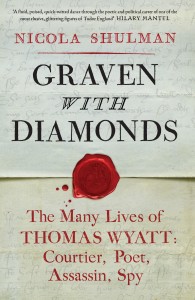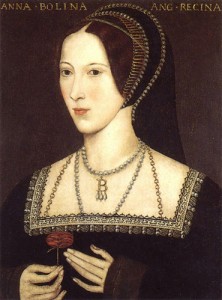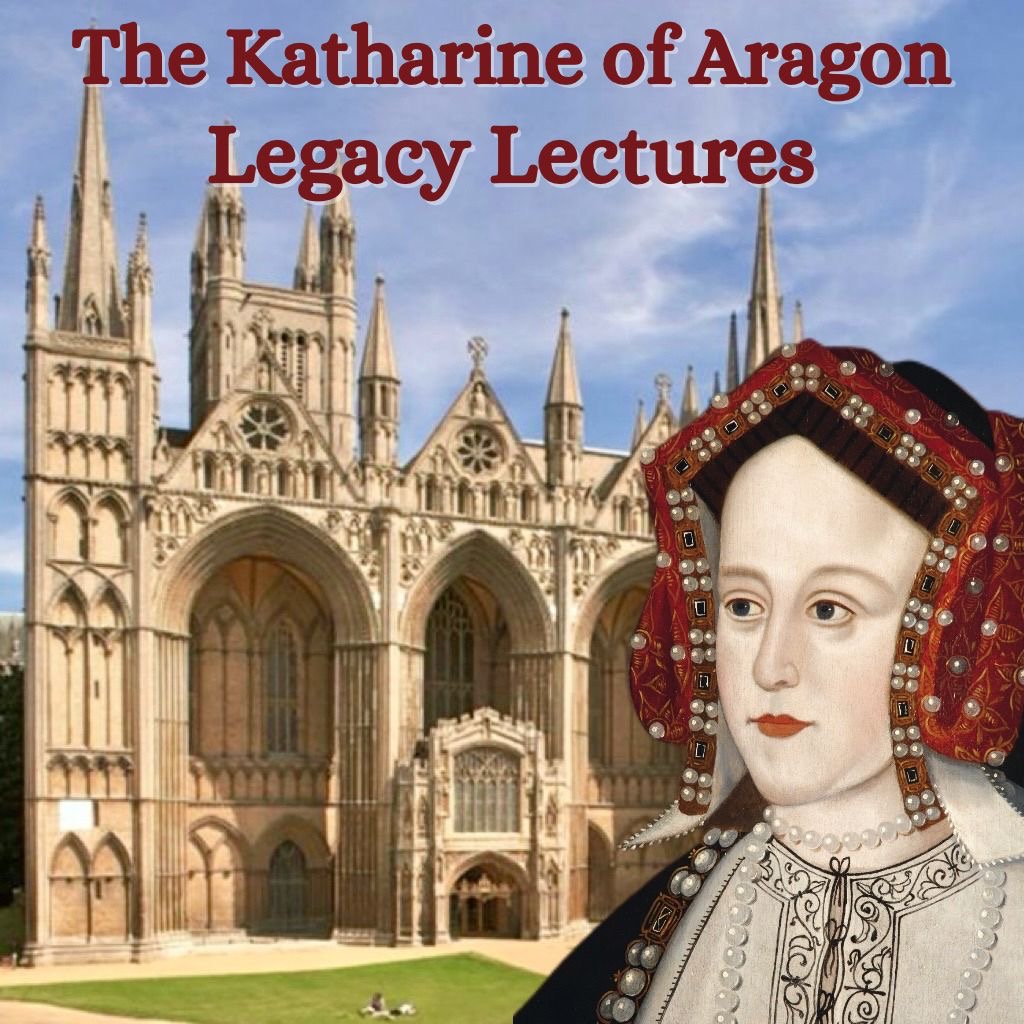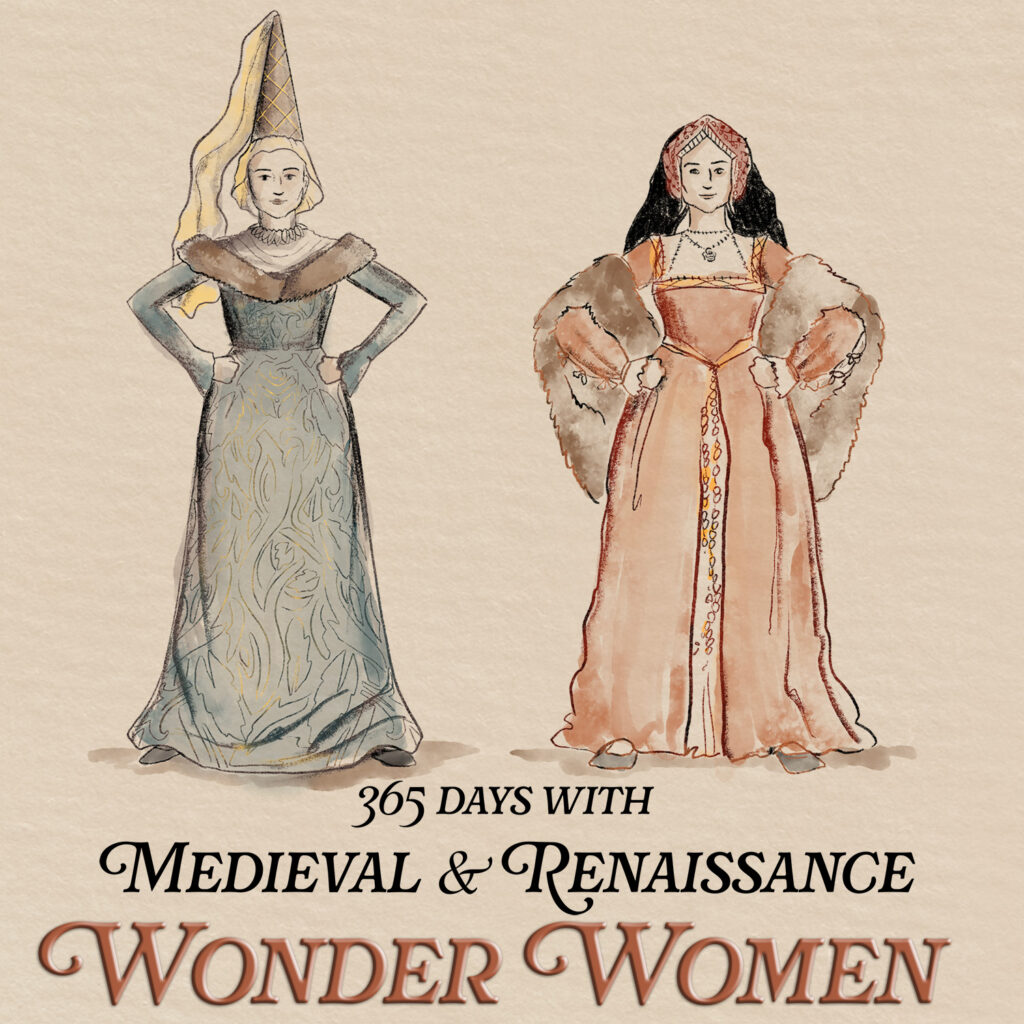1: Tell us about Graven With Diamonds
It’s a book about Henry VIII’s greatest poet, Sir Thomas Wyatt, and his lyric poetry.
Hilary Mantel’s new novel makes much of the brilliance of Sir Thomas Wyatt, without quite saying what it is. The aim of my book is to show us that. What was Wyatt doing, and what was brilliant about it.
It first of all puts his poetry in the context of the court, so we can understand how love poetry was a much more important form of utterance then than it was now. It shows how love, and ideas of love, were dominant in Henry’s own life and how his chivalric fantasies directed his actions. It analyses Henry’s obsession with Anne Boleyn from this new point of view, and shows Anne as a woman who had the world of poetry at her command – and knew how to use it.
Then, it shows how the poetry worked. In the 1530s, lyric poetry made up a great part of the entertainment of the inner court – and it also came to be a way to express secrets.
You can find out a surprising amount, Day-to-day court life in the 1520s and 1530s left very faint traces behind for posterity, because the courtiers did most of their important business face-to-face. For example, Anne Boleyn was the most important person at Henry’s court for several years, but the paper trail she left was negligible. The same is true of Sir Henry Norris, Henry’s Groom of the Stool and most senior figure at court, who was to die along with Anne. His considerable business was done face to face in corridors and window-embrasures, concluded with the clapping of a hand on a velvet shoulder. He left behind no scrap of writing. What remains of the actual life of the court are a few descriptions of formal entertainments, and – the lyric poetry.
That seems like little, but it isn’t. When I put the poetry into the context of Wyatt’s life, I did expect to cast some light on it, but I thought it would be like the light you put on in a cupboard: you see the back of the cupboard, a few shelves. But it wasn’t. It was more as if as if I’d pushed the switch and discovered that what I thought was a cupboard was a corridor, with doors all the way along which opened onto world of the inner court, with glimpses of the way men and women actually felt. I was able to view these people – Anne, Henry, Wyatt, Queen Catherine, Anne’s ‘lovers’, the ladies and gentlemen of the court, Cromwell’s cast of legates and spies all the rest of them, in new positions and with a new clarity.
Graven with Diamonds narrates Wyatt’s life story. We see him as the court’s ornament, producing poetry for other, duller courtiers to give their girlfriends; we follow him to the Tower in 1536 along with Anne’s ‘lovers’, and explain how he escaped that fate to become Cromwell’s favourite – a mixed blessing. He was then thrust into the unstable world of spy and counter-spy as one of Cromwell’s trusted (and mistrusted) diplomats. This road snaked back to the tower for Wyatt – and ultimately for Cromwell himself. As Wyatt’s life darkens, we begin to see other, much darker messages in his poetry.
Graven with Diamonds isn’t an academic book. I wanted to produce a strong, entertaining narrative for the general reader out of this rather specialised subject of 16th century love and love poetry, and I hope I have succeeded. I wanted to make people laugh. Readers often tell me that they found it very entertaining, and that makes me very happy.
2: What makes Thomas Wyatt such a fascinating subject?
I have been fascinated with him since I first read his poetry as an undergraduate. The poetry appealed to me then because it is discernibly the work of a young person, with a young person’s longings. Most people in Henry’s court sounded like old men: pedantic, careful, verbose; but Wyatt seemed like a Hamlet to their Polonius. He was glamorous, handsome, clever, full of humour and immensely witty. He was involved with one of the most fascinating women in English history. His heart was broken. Wyatt wrote about things that concerned me then. No-one has written better of the pain of love.
They flee from me that sometime did me seek;…
He wrote about the feeling of impotence and bewilderment, when everyone except you seems to thrive and know what they are doing
“I am of them that farthest cometh behind”
He wrote about not knowing how on earth you had got yourself into this mess:
The stars be hid that led me to this pain
He articulated what it is to be inarticulate.
And I can not the thing I mean
Myself express.
Nevertheless, I found the poetry hard to understand. It seemed opaque and slippery to me. I couldn’t find a purchase. It was a long time before I realised why: it was supposed to be slippery. It was a poetry for burying secret thoughts. Once I realised that, I began to see that Wyatt wasn’t just clever, he was a kind of genius who had discovered a way of communicating secrets, perfectly adapted for the treacherous world he inhabited.
Secrets about love affairs (including that of Henry and Anne) reposed in these poems. But they were also a place where Wyatt could write about things that no-one was allowed to talk about, such as the King’s draconian treason laws and unstable policies, and the perils of a life where enemies circled and the ground moved constantly beneath your feet. For an ambitious courtier and diplomat like Wyatt, perpetually under pressure to perform, implicated in the factional politics of Henry’s court, one wrong decision could lead to the scaffold.
3. When were Wyatt’s poems first published?
Wyatt’s poems were not published in his lifetime. The single most important fact about Wyatt’s poems, is this: they were written by hand and circulated amongst a small number of people in and around the court. They were read out at the court entertainments, they were whispered amongst people jostling for an audience with Cromwell, they were passed from hand to hand with a word changed here and there to make it fit the predicament of this or that person. The inner court consisted of fewer than a hundred people- the size of a year group in a large secondary school – and they all knew one another. That made the poems into potent medium for gossip, speculation, jokes, and comment on the affairs of the court. This is the side of the poetry which I have tried to resurrect.
After he was dead, a Printer called Richard Tottel published (in 1557) some of his lyrics along with those of his younger disciple, the Earl of Surrey, in a book called “Tottel’s Miscellany”. Tottel didn’t appreciate that Wyatt’s lyrics were intended for private consumption; in fact he prided himself for having wrested them from their owners, “the ungentle hoarders of such treasures”. He didn’t know that their strength and genius lay in their thrilling potential for ambiguity. His idea was to provide love poetry for the growing middle class of Elizabeth’s day, who wanted some courtship tips in their newly prosperous and comfortable lives. He gave the poems titles and explained them away. Nevertheless, the book enjoyed a huge success as a popular courtship manual for unconfident suitors, until it went out of fashion and became a bit of a joke for the new generation of poets like Shakespeare and Spenser.
4: Do you believe that Wyatt and Anne Boleyn were once romantically involved?
The short answer is yes, I do. The nature of their association requires a more lengthy and complex answer than I can really give in this interview. In GWD I devote a whole chapter to the question and look at all the evidence, poetical and non-poetical, including the many scandalous stories about Anne and Wyatt that circulated after Anne’s death. Did Wyatt flee the court in 1527 because Henry was angered by rumours about Wyatt and Anne? How many of Wyatt’s poems are written for Anne? How did this relate to the events of 1536, when Wyatt was arrested along with Anne and her ‘lovers’? I also show a new aspect to Wyatt and Anne’s relationship, where we see Wyatt drawn into Anne’s campaign to become Queen of England. Because poetry was the fashionable form of communication, and Anne was the most brilliant woman at court, she recruited him and his poetry to promote her cause.
5: Thomas Wyatt was incarcerated in the Tower of London during Anne Boleyn’s downfall but was later released. Why do you think he survived when so many others around him fell?
I think he survived because of the interventions of Thomas Cromwell. As I explain in the book, I think it extremely likely that he gave Cromwell information about goings-on in the Queen’s chamber in return for his life. No witnesses were called for the trial but there were many people who came forward with information; and for some in the inner court, the occasion was also seen as an opportunity to skewer your enemies and enrich yourself with the lands and offices of the dead. No-one talked about any of this, of course: there is very little record of what people actually did now and what they thought about this shameful episode of the Queen’s judicial murder. But one place where there are still traces of it is in the poems. Because Lyric poetry was not officially a medium to speak about grave or serious matters, the poetry going round the court passed beneath the censorship radar of the authorities.
Wyatt watched the execution of Anne Boelyn from his cell in the tower, and wrote about it. He was there partly through the machinations of an old enemy. At that point, only someone as powerful as Cromwell could now extract him. I believe this came at a price. Upon his release Cromwell rewarded him with the enormous sum of £100 (enough to buy you a small London house) and very soon after sent him to Spain on his most delicate diplomatic mission.
6: Do you have a favourite Wyatt poem?
One of the pleasures about doing the book was coming to appreciate the beauty of Wyatt’s less well-known poems, and the depths beneath their slippery surfaces, However, I still love his great anthology piece, one of the saddest utterances in the English language with an opening line which we will all have a use for one day.
THEY FLEE FROM ME THAT SOMETIME DID ME SEEK.
They flee from me that sometime did me seek
With naked foot stalking in my chamber.
I have seen them gentle, tame, and meek
That now are wild and do not remember
That some time they put themselves in danger
To take bread at my hand; and now they range
Busily seeking with a continual change.
Thanked be fortune it hath been otherwise
Twenty times better,[1] but once in special,
In thin array after a pleasant guise,
When her loose gown from her shoulders did fall
And she me caught in her arms long and small,
Therewithal sweetly did me kiss
And softly said, “Dear heart, how like you this?”
It was no dream: I lay broad waking.
But all is turned thorough my gentleness[2]
Into a strange fashion of forsaking.
And I have leave to go of her goodness
And she also to use newfangleness.
But since that I so kindly am served
I would fain know what she hath deserved.
By the way, one way of thinking about this poem is to ask yourself: ‘Who are “they”?’
With thanks for asking me to contribute to your site.
[1] Thank fortune, there are at least twenty occasions when my luck went the other way (i.e. and fortune smiled upon me)
[2] As a consequence of my own courteous or ‘gentle’ behavior.




















That was fascinating. I am now eager to read your book. Thomas Wyatt just came alive for me.
It will be fascinating to read about someone who tends to be in the background in comparison to some in the story about Anne.